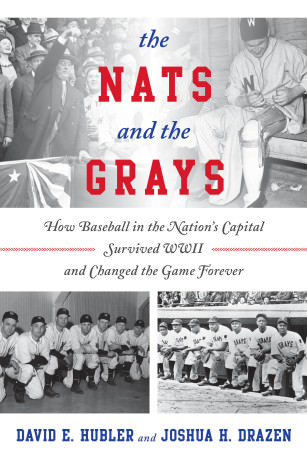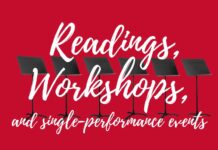The days may have been dark on the home-front during WWII America for Tom Brokow’s The Greatest Generation, but baseball endured. Baseball was the National Pastime; playing ball, along with Big Bands and Hollywood movies, gave a sense of continuity and unity as the war raged on.
Whether you are a Baby Boomer whose mom threw out your baseball cards, or a DC area Millennials with interest sky high for the current Washington Nationals with its heaps of young talent and scurrying around the bases, larger than life-sized Presidents, there is a new book for you.
The book is The Nats and the Grays: How Baseball in the Nation’s Capital Survived WWII and Changed the Game Forever. The local author is David E. Hubler from Fairfax County, Virginia, and he wrote it with Joshua H. Drazen.

Based upon a recent rich, lively, deeply enthralling interview, Hubler’s book is no dry history or ribald fiction. It is a special book about rarely written events from a key time now fading from us. For theater mavens, it is not The Year the Yankees Lost the Pennant, later made into the legendary Broadway musical and movie Damn Yankees.
So as the current edition Washington Nationals continue to rock-and-rolling good ball, let’s go back to the 1940s when the Washington baseball club was in the midst of lousy times and long drought from appearing in the World Series. Attendance at the old Griffith Stadium was far from as robust as it is now at Nats Park.
War was raging and the major leagues had many a replacement players. That meant two decent seasons (1943 and 1945) for the Nats of those days. Yet the slogan “first in was, first in peace, and last in the American League” was usually correct.
In The Nats and the Grays, Hubler gives readers a look at another DC professional baseball club at the time. Perhaps less well-known to some now, it was the Homestead Grays who played some of their “home” games in DC rather than in hometown Pittsburgh. These were the Homestead Grays in the days of August Wilson’s Seven Guitars.
With introduction, please see this edited interview with David Hubler, author of The Nats and the Grays: How Baseball in the Nation’s Capital Survived WWII and Changed the Game Forever.
David Siegel: What is The Nats and the Grays about?
David Hubler: The Nats and the Grays is a history not only of professional baseball in DC during WWII but also of the relationship between Washington’s franchise owner Clark Griffith and his long-time friend FDR (they first met in 1917), an avid baseball fan who often sought Griffith’s advice about the team’s chances before placing friendly bets with his Cabinet members. It was largely due to FDR’s insistence that baseball continue as a wartime diversion that we have almost universal night baseball today.
What was the inspiration for you to write the book?
The book started out as a novel. I’d always been intrigued about wartime “replacement” players who made it to the major leagues during the war to fill the rosters in place of the stars and regulars who went to war (Joe DiMaggio, Ted Williams, Hank Greenberg, and Bob Feller among others).
Why did you decide to write about both the Washington Nationals and the Homestead Grays baseball teams?
The Homestead Grays of the Negro National League became the de facto home team in DC although the club was based near Pittsburgh. Also, they were by far the better of the two DC teams but couldn’t crack the color line despite a very active black press in DC, Pittsburgh, and elsewhere that continually fought for integration. Also, DC had a large middle class black population that supported the Grays who played in Griffith Stadium.
I would think much history of the Washington Nationals and Major League Baseball may be well known and research material available. What about the Grays?
The Grays and other Negro League teams and players have been written about extensively. Brad Snyder’s Beyond the Shadow of the Senators is an especially fine history of the Grays. I also had online access to issues of the African-American newspapers published in DC and Baltimore through membership in the Society for American Baseball Research (SABR).
As you did your research, were there any true surprises you would like to divulge?
I love the story of Bert Shepard. A prewar minor league pitcher and wartime flier who was shot down over Germany and gravely wounded. He was taken to a POW camp where a German doctor amputated his right leg and a Canadian POW fashioned a wooden leg for him. While recuperating at Walter Reed Hospital in 1945, he impressed a visiting high level Cabinet official by his determination to make the major leagues. Word got back to Clark Griffith who brought him in to spring training camp with the idea of signing him to pitch batting practice as a morale booster. Believe it or not, there was a brief bidding war for his services between Griffith and the Yankees! Shepard actually did make it to the majors as a Washington hurler, but I won’t spoil the story by revealing how that happened.
Why should someone read The Nats and the Grays? Or perhaps give it as a gift?
I must say that the further I got into the research, the more in awe I was of how many unknown facts and incidents, on the field and off, occurred during those 3 ½ years that the US was in the war. Why, for instance, did the team hold spring training for three seasons on the UMD campus in suburban Maryland, and how did the players cope with the scalding summer heat of St. Louis without air conditioning? The book provides a rare look at wartime DC that will be of interest to native Washingtonians and to WWII history buffs.
Is there a question you aren’t usually asked, that you would like to respond to right now?
The question most often asked is, “How long did it take you to write it?” No one asks me how long it will take to read The Nats and the Grays. My answer/advice would be to approach the narrative like a fine wine so as to enjoy it to the fullest.
Note: Hubler will be participating in the September Fall for the Book festival at George Mason University. He will also speaking at Northern Virginia Community College in later October.




